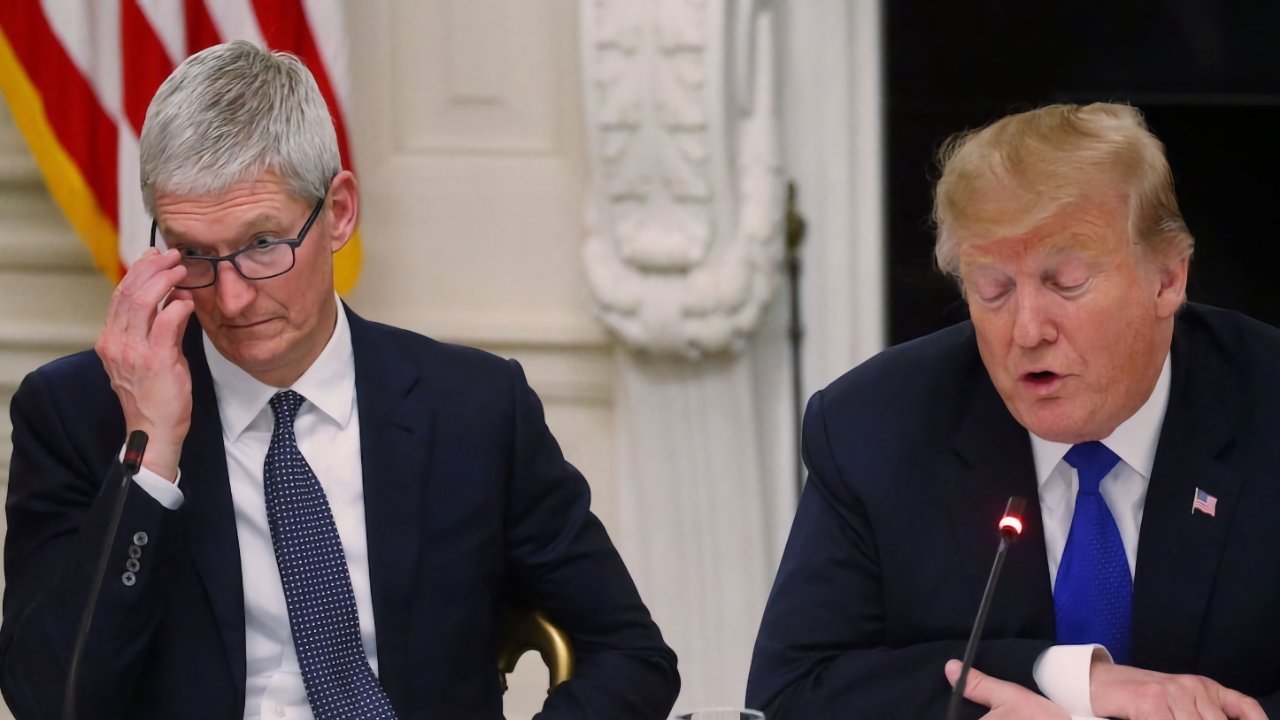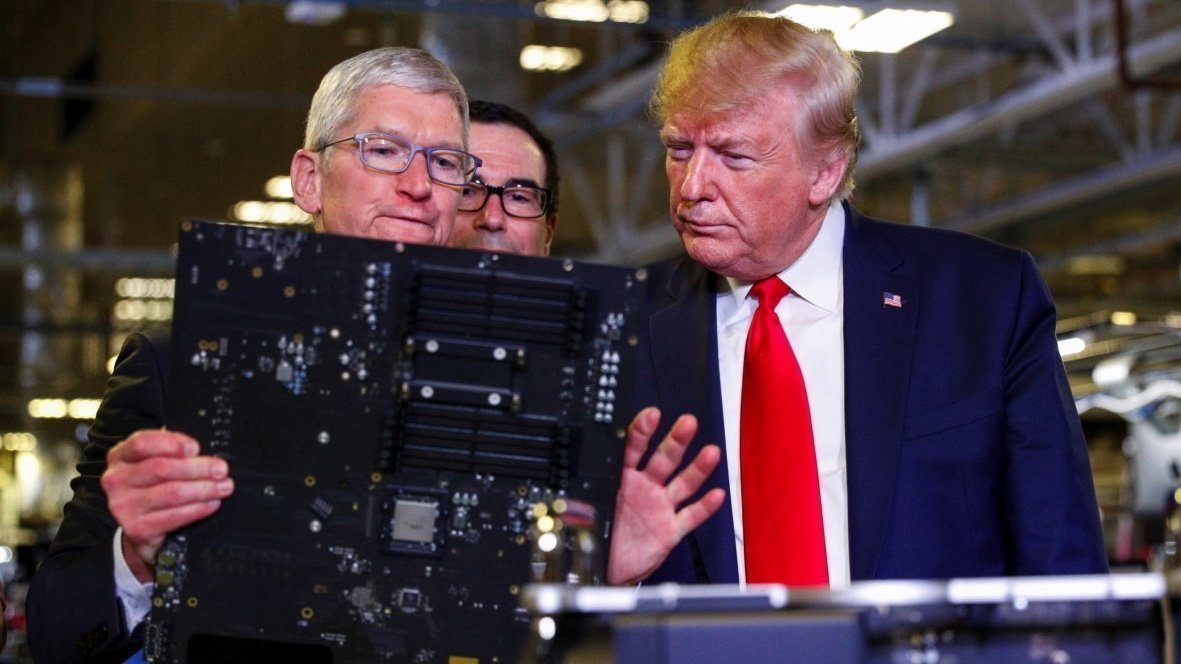Trade war escalations between Trump and China to significantly impact Apple
Apple could be severely affected as Trump reportedly pressures countries to limit their business dealings with China, which will result in more retaliations against US companies.

Tim Cook and Donal Trump in 2019 -- image credit: White House
China previously called Trump's trade war a joke and said it would not retaliate further than matching what was then said to be a 125% tariff imposed by the US. That tariff was then revealed to actually be 145%, and China did not escalate its own tariffs -- although it did halt rare earth mineral exports.
Now, however, CNBC reports that China has responded to what appears to be Trump's next move. While not announced by Trump or any other country involved, it is believed that isolating China is a key part of the White House's tariff negotiations worldwide.
"China firmly opposes any party reaching a deal at the expense of China's interests," a spokesperson for the Chinese Ministry of Commerce said, in translation. "If this happens, China will not accept it and will resolutely take reciprocal countermeasures."
In a press release from the Chinese Ministry of Commerce, the spokesperson went further and, again in translation, accused the US of having "coerced all parties to start so-called 'reciprocal tariff' negotiations."
"China believes that all parties should stand on the side of fairness and justice on the issue of 'reciprocal tariffs'," continued the spokesperson, "stand on the side of historical correctness, and defend international economic and trade rules and multilateral trading system."
In recent days, Trump has claimed to be in discussions with China and according to C-SPAN, says he expects an agreement to be reached "over the next three or four weeks."
According to Politico, no such discussions have taken place, even though China might allow its new international trade representative to negotiate. It's reportedly because Trump insists on dealing only with China's President Xi Jinping.
What this means for Apple
Analyst Ming-Chi Kuo, the risks for Apple are severe. Countries could impose their own tariffs on components sent to them from China, for example.
This CNBC report may suggest that tariff risks for Apple could escalate significantly, making the entire situation highly unpredictable.
1. The Chinese Ministry of Commerce's official statement, as reported by CNBC, indicates that the U.S. government's plan to use tariff-- (Ming-Chi Kuo) (@mingchikuo)
Kuo's tweet continues by noting that "if only the US imposes high tariffs on Chinese imports, the risks [for Apple] are manageable."
"However, if other countries also raise tariffs on Chinese goods," he says, "Apple would need to establish more non-China iPhone production lines to meet demand in markets beyond the U.S., meaning the tariff risks for Apple would become immeasurable and entirely uncontrollable."
What happens next
Currently Apple is benefiting from an exemption to the China tariffs, although Trump repeatedly denies that there are any exemptions. At the same time, Trump also paused all tariffs -- except for those on China.

Tim Cook was able to get Apple a tariff exemption because he's kept up a working relationship with Trump (right)
Apple is likely to face further tariffs after the conclusion of a spurious investigation into any national security concerns with semiconductor production. Trump says Apple has not been given what he calls "exception," but rather it belongs in a different "bucket' of tariffs.
That bucket is one concerning semiconductors, but White House documentation backdates the investigation to before Trump's "reciprocal" tariffs were announced. It's not clear why Apple or other firms were then put into the presumably general "bucket" of tariffs.
It is clear, though, that the investigation will be followed by tariffs. While the documentation invites submissions by interested parties and purports that it will only impose tariffs if there are national security concerns, it is now certain to impose them.
That's because commerce secretary Howard Lutnick has already said on April 15 that semiconductor tariffs are "coming in probably a month or two." Trump, at the same time, said they would be imposed "next week."
Despite Tim Cook having reportedly persuaded Trump to exempt Apple from the tariffs, it has also been confirmed that the relief is only temporary. Apple was granted its exemption late on Friday, April 9, and shares rose from $198.15 to $211.44 when trading opened the following Monday.
That's still far below the $225.19 they were trading at before the "reciprocal" tariffs were announced. And at time of writing, they are down yet again, to $190.90.
Read on AppleInsider

Comments
Countries would be ill advised to apply tariffs on iPhones or parts as it would be harmful to their citizens and businesses.
Not to mention that China would retaliate against them possibly in a worse manner than the US.
Have faith in Apple management.
Time will tell.
Despite the naive confidence expressed by certain apologists here (and elsewhere), Apple is not going to be "fine," nor will the rest of us. Let us hope the unavoidable reality of these self-inflicted wounds will jolt enough people into demanding accountability, and cause members of Congress to be more fearful of the repercussions of continued inaction than they currently are of doing anything at all now to reassert their constitutional authority to stop this lunacy.
Trying to force sovereign nations to take sides will not work. Especially if the only deal is 'side with us. We can be trusted'.
The world is trying to widen its options, not reduce them. China has time on its side. The US doesn't.
I don't know if there are or aren't any talks (at whatever level) going on behind the scenes but it's a little premature to imagine anything substantial from the Chinese side. There is still a lot they can gain by holding back and not coming to the table and they know that trade is simply one arm of US goals. There is another that wants to stifle Chinese technological and geopolitical influence, neither of which can be dealt with now. That ship sailed years ago.
Time is ticking down on those 90 days and time has a tendency to fly.
Whilst the short term ups and downs of the stock market can be ignored, the bond markets and dollar depreciation cannot, unless the USA wants higher borrowing and imports costs (above the tariff increases) and a risk of loosing reserve currency status.
Lowering interest rates and tax cuts would make this all far worse.
Now Trump is in the kitchen and making a much deeper mess...
I guess Apple has to start fabs in the US, but the problem is that there are not enough educated engineers/people in the US to do it. The Mac Pro had a seriously arduous process to get going in the US, but they did it.
TSMC says they have to bring people from Taiwan to US to make the fabs run.
You need to invest in education and engineering, I have no doubt America can do it, but it is not something you can start from 0 to 100 instantly.
Imho Apple should go a different route, they should invest heavily in 3d Printing and go after the IKEA method(but Apple quality). If Apple makes the Apple store an assembly store and start selling Apple 3d printers, they can circumvent alot of the trouble AND build up domestic manufacturing in one swell swoop. AND also tend to the admins wishes of things getting made domestically.
Invest in the maker movement and repair movement, it makes sense. This also gives the AVP a reason to exist, as it becomes the best assembly/instruction manual you could ever want.
If this forces Apple to re-think their business model to 3d-printing and propping up the maker movement, then this whole mess could accidentally be a good thing. Think Apple made 3d-Printers that can make functional products. Possibly good for environment, possibly good for Apple. Possibly a win for customers.
Yes, he can continue to grift a few $$$ from his faithful but if those people are on the breadline or even out on the streets will they continue to fund his tacky lifestyle? Answers on a pinhead please.